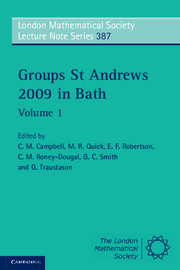Book contents
- Frontmatter
- Contents
- Introduction
- A speech in honour of John Cannon and Derek Holt
- Finite groups of Lie type and their representations
- Iterated monodromy groups
- Engel elements in groups
- Some classes of finite semigroups with kite-like egg-boxes of D-classes
- Structure of finite groups having few conjugacy class sizes
- Group theory in cryptography
- A survey of recent results in groups and orderings: word problems, embeddings and amalgamations
- A survey on the minimum genus and maximum order problems for bordered Klein surfaces
- On one-relator quotients of the modular group
- Miscellaneous results on supersolvable groups
- Automorphisms of products of finite groups
- A rational property of the irreducible characters of a finite group
- Automotives
- On n-abelian groups and their generalizations
- Computing with matrix groups over infinite fields
- Trends in infinite dimensional linear groups
- Engel conditions on orderable groups and in combinatorial problems (a survey)
- References
Automotives
Published online by Cambridge University Press: 05 July 2011
- Frontmatter
- Contents
- Introduction
- A speech in honour of John Cannon and Derek Holt
- Finite groups of Lie type and their representations
- Iterated monodromy groups
- Engel elements in groups
- Some classes of finite semigroups with kite-like egg-boxes of D-classes
- Structure of finite groups having few conjugacy class sizes
- Group theory in cryptography
- A survey of recent results in groups and orderings: word problems, embeddings and amalgamations
- A survey on the minimum genus and maximum order problems for bordered Klein surfaces
- On one-relator quotients of the modular group
- Miscellaneous results on supersolvable groups
- Automorphisms of products of finite groups
- A rational property of the irreducible characters of a finite group
- Automotives
- On n-abelian groups and their generalizations
- Computing with matrix groups over infinite fields
- Trends in infinite dimensional linear groups
- Engel conditions on orderable groups and in combinatorial problems (a survey)
- References
Summary
Abstract
This paper is an eclectic collection of results of the authors. The results come from “in some sense” basic, perhaps even simple, ideas covering a variety of topics. Many of these topics are related to classic results, but others simply reflect things that were of interest to the authors.
Introduction
This is an account of some of the work done by the authors, work which falls (mostly) under the section 20D45 of the 2000 Mathematics Subject Classification. The topics are eclectic, there is no apparent connection between these “motives”, but a common trait is that the notions involved are “elementary”, or “basic,” or any other adjective suggesting simplicity.
A number of topics are related to classic results, many of which do appear in popular group theory texts. As Hardy said, “debunking” is a large part of the activity of a mathematician: trying to find simpler explanations for known results could be rewarding indeed.
Some of the themes we discuss here were visited and revisited before and we have included our results among many others for the sake of giving a larger picture. However, our approach is anything but exhaustive.
Notation and Terminology
The letter G always denotes a group. If “G is finite” is not specified, it is understood that the finiteness condition is lifted.
- Type
- Chapter
- Information
- Groups St Andrews 2009 in Bath , pp. 228 - 243Publisher: Cambridge University PressPrint publication year: 2011

